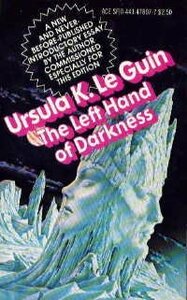Take a photo of a barcode or cover
adventurous
reflective
slow-paced
Plot or Character Driven:
A mix
Strong character development:
Complicated
Loveable characters:
Complicated
Diverse cast of characters:
Complicated
Flaws of characters a main focus:
Complicated
adventurous
challenging
inspiring
medium-paced
Plot or Character Driven:
Plot
Strong character development:
Complicated
Loveable characters:
Yes
Diverse cast of characters:
Yes
Flaws of characters a main focus:
Complicated
adventurous
challenging
dark
reflective
slow-paced
Plot or Character Driven:
A mix
Strong character development:
Yes
Loveable characters:
No
Diverse cast of characters:
Complicated
Flaws of characters a main focus:
Complicated
I have a complicated relationship with this book. On the one hand, the clearly groundbreaking lack of gender constructs were genuinely interesting, while Le Guin undercuts the audience’s reading of such by choosing to make Genly such a misogynist that he continually refers to this planet of (essentially) trans aliens by He/Him pronouns. I read in the afterword that she released a later version of the books changing all pronouns to She/Her, an equally appropriate choice given the description of the locals on the planet, but I wonder if I ever get the chance to read that how it would actually affect my experience.
The author has no problem tossing local sayings, place names, person names, and concepts at you without much explanation for much of the book (as it is written in a travelogue style which expects the reader to simply pick up and store things in their memory with little context) and I really could have done with an index or a map or even a short dictionary as one might find in an anthropologist’s notes of a more analog era. On the other hand, Le Guin certainly possesses such a clear vision of the planet that I can imagine I have left much to be picked up in a second reading, and I am sure I would gain more having already passed through it once.
Perhaps combined with the fact that I inexplicably chose to read this in the height of summer, this book was not the favorite I was expecting it to be, based on positive reviews I had heard from friends and family. Perhaps it is not my style, perhaps I was too annoyed at my constant feeling of disorientation, perhaps I was too disappointed in the male default of the story, or perhaps it was all simply over my head.
The author has no problem tossing local sayings, place names, person names, and concepts at you without much explanation for much of the book (as it is written in a travelogue style which expects the reader to simply pick up and store things in their memory with little context) and I really could have done with an index or a map or even a short dictionary as one might find in an anthropologist’s notes of a more analog era. On the other hand, Le Guin certainly possesses such a clear vision of the planet that I can imagine I have left much to be picked up in a second reading, and I am sure I would gain more having already passed through it once.
Perhaps combined with the fact that I inexplicably chose to read this in the height of summer, this book was not the favorite I was expecting it to be, based on positive reviews I had heard from friends and family. Perhaps it is not my style, perhaps I was too annoyed at my constant feeling of disorientation, perhaps I was too disappointed in the male default of the story, or perhaps it was all simply over my head.
medium-paced
Plot or Character Driven:
A mix
Strong character development:
Complicated
Loveable characters:
Complicated
Diverse cast of characters:
No
Flaws of characters a main focus:
Complicated
adventurous
reflective
slow-paced
Plot or Character Driven:
A mix
Strong character development:
Yes
Loveable characters:
Yes
Diverse cast of characters:
Complicated
Flaws of characters a main focus:
Complicated
mysterious
reflective
medium-paced
adventurous
challenging
emotional
inspiring
reflective
medium-paced
Plot or Character Driven:
A mix
Strong character development:
Yes
Loveable characters:
Yes
Diverse cast of characters:
Complicated
Flaws of characters a main focus:
No
adventurous
dark
reflective
medium-paced
Plot or Character Driven:
A mix
Strong character development:
Yes
Loveable characters:
Complicated
Diverse cast of characters:
Complicated
Flaws of characters a main focus:
Complicated
I love Le Guin's reflections on writing this. She completed it believing the protagonist was the emissary but in reflection, Estraven was the source of all compassion, liberation, and imagination in the novel. This realization spurred her reframing of women and nonbinary folks as main characters in her books and imagery.
I think Le Guin (and Octavia Butler) blow other SF authors out of the water and all the way to Andromeda; a lot of that lies in the compassion futures they chart and small liberations they enact in their worlds.
I think Le Guin (and Octavia Butler) blow other SF authors out of the water and all the way to Andromeda; a lot of that lies in the compassion futures they chart and small liberations they enact in their worlds.




